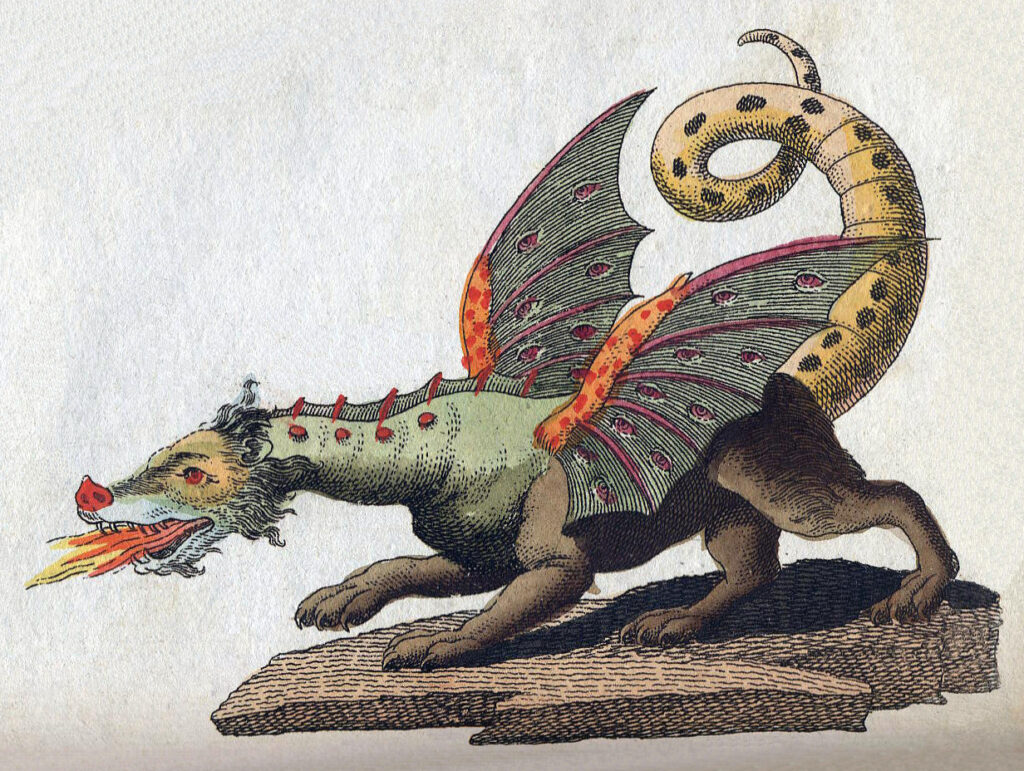Old English (c.450—1066) was the language of the Anglo-Saxon settlers of England, who began speaking it sometime in the middle of the fifth century. Old English literature’s vocabulary comes from German, and its earliest poets wrote in a distinctive kind of verse using accentual meter, probably due to the language’s strongly inflected sound.
Because it is radically different from Middle English or Modern English, studying Old English literature in its original form requires an effort equivalent to learning a foreign language. Nevertheless, some familiarity with Old English provides a more profound understanding of the English of today.
Old English Literature: German vs. Latin
Modern English vocabulary originating in the Germanic Old English tends to come more from the gut and to be spoken in a lower tone of voice than later, French-derived English words. The Old English word “tun” (now “town”), for example, feels very different than the later, Middle English “village.” Knowing a little of the early history of English may make us more sensitive to the complexity, both in sound and sense, of our English diction.
Although Latin remained the language of learning in England even after the Romans withdrew from Britain in the fifth century, ordinary Anglo-Saxons, of Scandinavian and Germanic origin, spoke their vernacular: English. Anglo-Saxons told stories and sung songs in their language, Old English, for six hundred years—from the fifth century all the way until Middle English began to develop in the eleventh century (i.e. until after the French-speaking Normans conquered England in the year 1066).
Scholars in the English-speaking world wrote in Latin, the language of learning from the time of the Roman Empire; nevertheless, the Anglo-Saxons who settled England spoke Old English in their day-to-day affairs. Amazingly, this divide still exists: lawyers and medical doctors in English-speaking nations must learn a great deal of Latin in order to understand legal terms and anatomy, for example, while the rest of us speak vernacular English.
Bede: Old English Literature’s First Great Author
The Venerable Bede (c.672-735), early England’s greatest scholar, a monk who wrote his Ecclesiastical History of the English People in Latin, composed a song in his native Old English on his deathbed. We know it as “Bede’s Death Song.”
Try to sound out Bede’s little poem, bearing a few things in mind: English no longer has the letter ð, just pronounce it “th;” the letter ‘f’ should sound more like a ‘v’ when found in the middle of words (“yfels”=“evils”); and most of the time you see the letter ‘g,’ say it as a ‘y’ unless it precedes a stressed syllable. How much has changed over a thousand years!
Now, give it a shot, and then consider the translation into modern English below it:
Fore ðæm nedfere nænig weorðe ðonc snottora ðon him ðearf siæ to ymbhycgenne ær his hinionge hwæt his gastæ godes oððe yfles æfter deað dæge doemed weorðe
Before the Needful-journey, nobody be Thoughtfuller than him, tougher than he To truly think, before his hying, What his ghost’s goods and evils After death day’s doom will be.
My translation of Bede’s poem into modern English attempts to preserve the alliteration of “deað dæge doemed” in the final line, and to keep each of the five lines to four or five stressed syllables each in order to preserve the accentual-verse form. Old English poets wrote in lines with four stressed syllables, a pause (called a caesura) breaking the line in half, and then some alliteration linking the halves together:
ˊ ˊ ˊ ˊ To truly think, | | before his hying,
Also note the diction. French words flooded the English language after 1066, but the original Germanic Old English vocabulary tends to be curt-sounding, more forceful.
For example, a contemporary English speaker might modernize “gastæ” in line five to “spirit,” but the softer, two-syllable word “spirit” comes to us from the French influence. “Ghost” keeps the soul of the Old English diction better than the French-sounding “spirit.” (Pun intended.)
Such choices abound when modernizing Old English literature—simply considering them means one is thinking like a reader.
What are Representative Works of Old English Literature?
Reading Old English works and taking a stab at sounding out the original language will help contemporary students of English to be more aware of matters of prosody and diction in our modern English. Bear in mind that these recommended Old English works are representative, i.e. they stand in for a lengthy and rich literary period full of other worthy texts you may wish to read.
Be that as it may, a bit of time spent with the two recommended poems, with the riddles, and with poet Seamus Heaney’s wonderful modern translation of Beowulf, especially glancing over the Old English on the facing pages and thinking about Heaney’s choices with regard to prosody and diction, will help anyone studying English think like a reader.
Beowulf
The epic poem Beowulf stands above all other Old English literature for its poetic beauty and its ripping good story of a warrior named Beowulf.
Beowulf is a Scandanavian hero born into a Swedish tribe called the Geats, who travels south to save a Danish kingdom from the ravages of a monster called Grendel. The hero battles Grendel, and Grendel’s even more fearsome mother, before returning to his homeland to become king of the Geats himself. The poem concludes with King Beowulf’s glorious battle against a fire-breathing dragon, furious at the theft of a cup from his treasure hoard. This is the first literary work in which a knight battles a fire-breathing dragon, and sets the pattern for all such works to follow.
Lovers of J.R.R. Tolkien’s The Hobbit, for example, will recognize Beowulf’s dragon, draca, as the inspiration for The Hobbit’s dragon, Smaug.
Tolkien, in fact, was a scholar of Old English who wrote his own translation of Beowulf. Fans of The Lord of the Rings will no doubt also recognize many inspirations for that work while reading Beowulf (such as an Old English word for “lord,” theoden, serving as the name for the king of Rohan in Tolkien’s books).

“Caedmon’s Hymn”
The story of the illiterate shepherd who miraculously composed a beautiful hymn (i.e. a song in praise of god), is related by Bede in his Ecclesiastical History of the English People. “Caedmon’s Hymn” is the earliest surviving poem written in English.
As you read the version below (from a mid-1100s manuscript), we will add another obsolete letter, ƿ (“wynn”), which should be pronounced similar to modern English ‘w.’ (Also, the ‘⁊’ character beginning line three is merely a symbol for “and.”)
Nu ƿe sculon herian heofon rices ƿeard. metudes mihte. ⁊ his mod ge þanc. ƿurc ƿuldor fæder. sƿa he ƿun- dra ge hƿilc ece drihten ord astalde. He ærest ge scop ylda bearnum heofon to rofe. halig scyppend. middan gearde mancynnes ƿeard ece drihten. Æfter tida firum on foldum frea ælmihtig.1
Now to honor heaven’s overseer, mighty architect, and his blueprints, work of a wondrous father. So he glo- ries—eternal foreman— in first building. He the first ancestors shaped, children under heaven’s roof. Holy creator! [Of] Middle Earth’s mankind overseer, eternal foreman. After organizing men into nations: Master almighty.
In my translation above, I brought out the Old English poem’s suggestion of God as an architect and supervisor of his crew, mankind, by using diction emphasizing this idea. The word “ƿeard,” literally “ward,” becomes “overseer,” while “drihten,” “leader,” is translated “foreman,” for example. The literal “measurer mighty” (“metudes mihte”) of the second line I give here as “mighty architect.” Etc.
Try translating the original poem using any of the numerous online glossaries of Old English, and see how one’s choice of synonyms, i.e. diction, affects the poem’s meaning.
Old English declines verbs, lacks the indefinite articles (“a,” “an”), puts nouns into cases, and works in many other ways mysterious to the speaker of modern English, but do not allow fear of imperfection to keep you from giving it a try anyway.
“The Seafarer” (from the Exeter Book)

In “The Seafarer,” a sailor looks back at his hard experiences working on the ocean, which becomes allegorical. “The Seafarer” is a long lyric poem in the form of an elegy to life itself—vast, lonely, and fleeting.
The original Old English poem survives only in The Exeter Book (which also contains the Anglo-Saxon riddles).
The Exeter Book is a single manuscript written about the year 970. Unusually, its author wrote in English at a time when most scribes wrote in Latin. The cathedral whose library contains the book also lends it its name: Exeter Cathedral.
Eminent American poet Ezra Pound created a translation of “The Seafarer” in his book Ripostes (published 1913), omitting parts from the original poem and often departing from its literal wording, yet remaining faithful to its accentual force and spirit by maintaining the Old English’s alliteration:
THE SEAFARER
(From the early Anglo-Saxon text)
May I for my own self song’s truth reckon,
Journey’s jargon, how I in harsh days
Hardship endured oft.
Bitter breast-cares have I abided,
Known on my keel many a care’s hold,
And dire sea-surge, and there I oft spent
Narrow nightwatch nigh the ship’s head
While she tossed close to cliffs. Coldly afflicted,
My feet were by frost benumbed.
Chill its chains are; chafing sighs
Hew my heart round and hunger begot
Mere-weary mood. Lest man know not
That he on dry land loveliest liveth,
List how I, care-wretched, on ice-cold sea,
Weathered the winter, wretched outcast
Deprived of my kinsmen;
Hung with hard ice-flakes, where hail-scur flew,
There I heard naught save the harsh sea
And ice-cold wave, at whiles the swan cries,
Did for my games the gannet’s clamour,
Sea-fowls’ loudness was for me laughter,
The mews’ singing all my mead-drink.
Storms, on the stone-cliffs beaten, fell on the stern
In icy feathers; full oft the eagle screamed
With spray on his pinion.
Not any protector
May make merry man faring needy.
This he little believes, who aye in winsome life
Abides ’mid burghers some heavy business,
Wealthy and wine-flushed, how I weary oft
Must bide above brine.
Neareth nightshade, snoweth from north,
Frost froze the land, hail fell on earth then
Corn of the coldest. Nathless there knocketh now
The heart’s thought that I on high streams
The salt-wavy tumult traverse alone.
Moaneth alway my mind’s lust
That I fare forth, that I afar hence
Seek out a foreign fastness.
For this there’s no mood-lofty man over earth’s midst,
Not though he be given his good, but will have in his youth greed;
Nor his deed to the daring, nor his king to the faithful
But shall have his sorrow for sea-fare
Whatever his lord will.
He hath not heart for harping, nor in ring-having
Nor winsomeness to wife, nor world’s delight
Nor any whit else save the wave’s slash,
Yet longing comes upon him to fare forth on the water.
Bosque taketh blossom, cometh beauty of berries,
Fields to fairness, land fares brisker,
All this admonisheth man eager of mood,
The heart turns to travel so that he then thinks
On flood-ways to be far departing.
Cuckoo calleth with gloomy crying,
He singeth summerward, bodeth sorrow,
The bitter heart’s blood. Burgher knows not—
He the prosperous man—what some perform
Where wandering them widest draweth.
So that but now my heart burst from my breast-lock,
My mood ’mid the mere-flood,
Over the whale’s acre, would wander wide.
On earth’s shelter cometh oft to me,
Eager and ready, the crying lone-flyer,
Whets for the whale-path the heart irresistibly,
O’er tracks of ocean; seeing that anyhow
My lord deems to me this dead life
On loan and on land, I believe not
That any earth-weal eternal standeth
Save there be somewhat calamitous
That, ere a man’s tide go, turn it to twain.
Disease or oldness or sword-hate
Beats out the breath from doom-gripped body.
And for this, every earl whatever, for those speaking after—
Laud of the living, boasteth some last word,
That he will work ere he pass onward,
Frame on the fair earth ’gainst foes his malice,
Daring ado,...
So that all men shall honour him after
And his laud beyond them remain ’mid the English,
Aye, for ever, a lasting life’s-blast,
Delight mid the doughty.
Days little durable,
And all arrogance of earthen riches,
There come now no kings nor Cæsars
Nor gold-giving lords like those gone.
Howe’er in mirth most magnified,
Whoe’er lived in life most lordliest,
Drear all this excellence, delights undurable!
Waneth the watch, but the world holdeth.
Tomb hideth trouble. The blade is layed low.
Earthly glory ageth and seareth.
No man at all going the earth’s gait,
But age fares against him, his face paleth,
Grey-haired he groaneth, knows gone companions,
Lordly men are to earth o’ergiven,
Nor may he then the flesh-cover, whose life ceaseth,
Nor eat the sweet nor feel the sorry,
Nor stir hand nor think in mid heart,
And though he strew the grave with gold,
His born brothers, their buried bodies
Be an unlikely treasure hoard.
(Translation by Ezra Pound)
Old English or Anglo-Saxon riddles (from the Exeter Book)
Although there seems to have been a tradition of it in Latin literature, Old English writers perfected the art of making riddles.
A riddle is a word puzzle, whose solution generally depends on wordplay, posed as a question: often, “What am I?” The reader or hearer of the riddle must name the object or thing.
Once again, enjoyers of J.R.R. Tolkien’s work will recognize here the inspiration for the famous exchange of riddles between Bilbo and Gollum in his novel The Hobbit.
Subjects for the Old English riddles include natural phenomena, religious symbols, ordinary objects, and even some double entendres: riddles whose answers would seem to be obscene but whose solution is actually some innocent object. (Those riddles are NSFW!)
On the whole, these ancient word-puzzles are deeply engrossing and worth any aspiring reader of English literature’s time.
[Riddle 1]
Who is so clever and quick-witted
as to guess who goads me on my journey
when I get up, angry, at times awesome;
when I roar loudly and rampage over the land,
sometimes causing havoc; when I burn houses
and ransack palaces? Smoke rises,
ashen over roofs. There is a din on earth,
men die sudden deaths when I shake the forest,
the flourishing trees, and fell timber –
I with my roof of water, an avenger
driven far and wide by the powers above;
I carry on my back what once covered
every man, body and soul submerged
together in the water. Say what conceals me
or what I, who bear this burden, am called.
(Translation by Kevin Crowley-Holland, The Exeter Book of Riddles)
The riddle given above is often interpreted to mean a storm and the wind within it. The Exeter Book, however, provides no solutions for its riddles, and readers have debated for centuries what those answers might be.
Over 90 riddles may be found in The Exeter Book, and translations abound both online and in bookstores. The edition by Kevin Crowley-Holland, published by Penguin, has been a standard for decades.
For a deeper dive into Old English, Richard Marsden’s Cambridge Old English Reader (second edition) is a good place to start. It includes a beginner’s guide to reading the language as well as many fine examples of Old English literature.
Representative Works of Old English Literature
Beowulf, “Caedmon’s Hymn,” “The Seafarer,” and Anglo-Saxon riddles (from the Exeter Book)
- “Bede’s Ecclesiastical History and Caedmon’s Hymn.” Magd. MS.Lat.105, on folio 99 recto. Magdalen College: University of Oxford, magd.ox.ac.uk, 7 October 2023. ↩︎

